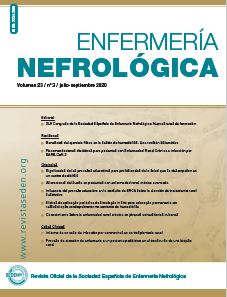Contenido del artículo principal
Resumen
Objetivo: Cuando un paciente ingresa a diálisis se generan importantes cambios que afectan el estilo de vida de ellos y su familia. Para abordar este ingreso, los profesionales de la salud deben implementar procesos de enseñanza orientados a mejorar la calidad de vida de los pacientes, además de salvarla.
Objetivo: Debido a lo relevante de estos procesos educativos, el estudio que se presenta a continuación buscó comprender los significados que otorgan los profesionales de la salud a los procesos educativos que desarrollan en usuarios con insuficiencia renal crónica en un centro de diálisis.
Material y Método: La investigación de tipo cualitativa, de diseño fenomenológico e interpretativo. La información generada a través de entrevistas en profundidad a profesionales médicos y de enfermería, fue analizada por medio del método de análisis de contenidos.
Resultados: Los resultados obtenidos permitieron comprender significados asociados a los periodos de educación, métodos utilizados y principalmente los elementos que facilitaban y obstaculizaban estos procesos.
Conclusión: Se concluye que los profesionales de la salud trabajan en base a un método no formalizado, donde el diálogo y la experiencia o trayectoria resultan fundamentales para generar estos procesos de enseñanza.
Palabras clave
Detalles del artículo
Derechos de autor 2020 Eugenia Karina Sanhueza-Inzunza, Carolina Alejandra Aparicio-Molina

Esta obra está bajo una licencia internacional Creative Commons Atribución-NoComercial 4.0.
Aviso de derechos de autor/a
© Los autores ceden de forma no exclusiva los derechos de explotación de los trabajos publicados y consiente en que su uso y distribución se realice con la Licencia Creative Commons Atribución - No comercial 4.0 Internacional (CC BY-NC 4.0). Puede consultar desde aquí la versión informativa y el texto legal de la licencia. Esta circunstancia ha de hacerse constar expresamente de esta forma cuando sea necesario.
Referencias
- Organización Mundial de la Salud. «WHO | Noncommunicable diseases», Organización Mundial de la Salud 2018. [Consultado 29 jul 2019]. Disponible en: https://www.who.int/en/news-room/fact-sheets/detail/noncommunicable-diseases.
- Alvarado L, Angulo D. Impacto del Rol de Enfermería en Pacientes con Insuficiencia Renal Crónica en el Instituto del Riñón y Diálisis Inrrsi San Martin Guayaquil. Tesis de grado; 2013. [consultado 17 jul 2019]. Disponible en: http://repositorio.ug.edu.ec/bitstream/redug/8728/1/TESIS%20FINAL.pdf
- Guerra T, Díaz A, Vidal K. La educación como estrategia para mejorar la adherencia de los pacientes en terapia dialítica. Rev Cubana Enfermer 2010; 26(2):52-62.
- Alfonso MT. Educación al Paciente Crónico. Rev Soc Esp Enferm Nefrol 1996;(1):6-15. [consultado 15 jul 2019]. Disponible en: https://www.revistaseden.org/files/art565_1.pdf.
- Cristina Herzog O. Educación al paciente y la familia en un programa de trasplante, experiencia en CLC. Rev Med Clin Condes 2010;21(2):293-9. DOI: https://doi.org/10.1016/S0716-8640(10)70537-X
- Rozo C. Fundamentos pedagógicos que sustentan el proceso de la educación en salud. Aquichan. 2002; 2(1):27-35.
- Barrios Araya S, Masalán Apip MP, Cook MP. Educación en Salud: En la búsqueda de metodologías innovadoras. Cienc Enfermer 2011;17(1):57-69. DOI: https://doi.org/10.4067/S0717-95532011000100007
- Tobón Correa O. El autocuidado una habilidad para vivir. Hacia promoc. Salud. 2015;8(1):38-50.
- Torres J, Velasco P, Ila A. Intervención enseñanza a grupo en una unidad de hemodiálisis. Rev Soc Esp Enferm Nefrol. 2012;15(1):178-9.
- Santana Díez MA, Aguirremota Corbera MR, Lodeiro Herraiz MP, González Vélez M, Castro Pereira S, Escudero Argaluza J. Resultados de un programa educativo con refuerzo audiovisual durante la sesión, en pacientes en hemodiálisis. Enfermer Nefrol 2017;20(2):126-31.
- Trilla Bernet J. La educación fuera de la escuela. Ámbitos no formales y educación social. Barcelona: Ariel; 2003.
- Leonello V, Oliveira M. Competencies for educational activities in nursing. Rev. Latino-Am. Enfermagem. 2008;16(2):177-83. DOI: https://doi.org/10.1590/S0104-11692008000200002
- Díaz Barriga Arceo F. Cognición situada y estrategias para el aprendizaje significativo. REDIE 2003;5(2):105-17.
Referencias
Organización Mundial de la Salud. «WHO | Noncommunicable diseases», Organización Mundial de la Salud 2018. [Consultado 29 jul 2019]. Disponible en: https://www.who.int/en/news-room/fact-sheets/detail/noncommunicable-diseases.
Alvarado L, Angulo D. Impacto del Rol de Enfermería en Pacientes con Insuficiencia Renal Crónica en el Instituto del Riñón y Diálisis Inrrsi San Martin Guayaquil. Tesis de grado; 2013. [consultado 17 jul 2019]. Disponible en: http://repositorio.ug.edu.ec/bitstream/redug/8728/1/TESIS%20FINAL.pdf
Guerra T, Díaz A, Vidal K. La educación como estrategia para mejorar la adherencia de los pacientes en terapia dialítica. Rev Cubana Enfermer 2010; 26(2):52-62.
Alfonso MT. Educación al Paciente Crónico. Rev Soc Esp Enferm Nefrol 1996;(1):6-15. [consultado 15 jul 2019]. Disponible en: https://www.revistaseden.org/files/art565_1.pdf.
Cristina Herzog O. Educación al paciente y la familia en un programa de trasplante, experiencia en CLC. Rev Med Clin Condes 2010;21(2):293-9. DOI: https://doi.org/10.1016/S0716-8640(10)70537-X
Rozo C. Fundamentos pedagógicos que sustentan el proceso de la educación en salud. Aquichan. 2002; 2(1):27-35.
Barrios Araya S, Masalán Apip MP, Cook MP. Educación en Salud: En la búsqueda de metodologías innovadoras. Cienc Enfermer 2011;17(1):57-69. DOI: https://doi.org/10.4067/S0717-95532011000100007
Tobón Correa O. El autocuidado una habilidad para vivir. Hacia promoc. Salud. 2015;8(1):38-50.
Torres J, Velasco P, Ila A. Intervención enseñanza a grupo en una unidad de hemodiálisis. Rev Soc Esp Enferm Nefrol. 2012;15(1):178-9.
Santana Díez MA, Aguirremota Corbera MR, Lodeiro Herraiz MP, González Vélez M, Castro Pereira S, Escudero Argaluza J. Resultados de un programa educativo con refuerzo audiovisual durante la sesión, en pacientes en hemodiálisis. Enfermer Nefrol 2017;20(2):126-31.
Trilla Bernet J. La educación fuera de la escuela. Ámbitos no formales y educación social. Barcelona: Ariel; 2003.
Leonello V, Oliveira M. Competencies for educational activities in nursing. Rev. Latino-Am. Enfermagem. 2008;16(2):177-83. DOI: https://doi.org/10.1590/S0104-11692008000200002
Díaz Barriga Arceo F. Cognición situada y estrategias para el aprendizaje significativo. REDIE 2003;5(2):105-17.




